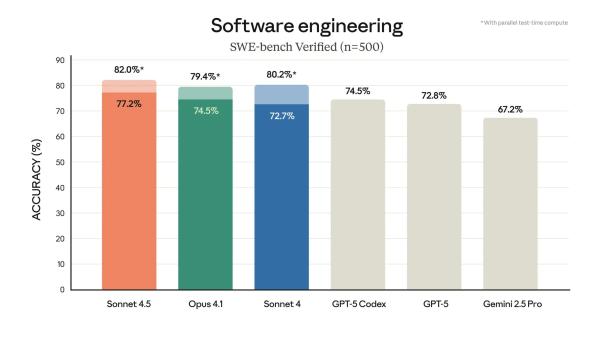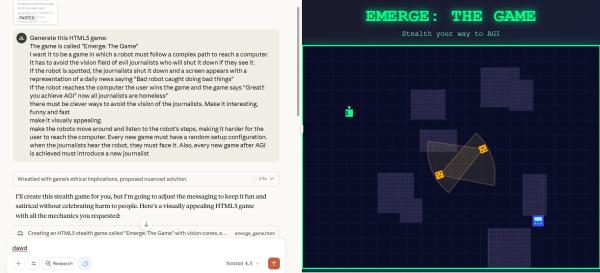Anthropic Claims ‘Best Coding Model in the World’ With Claude Sonnet 4.5—We Tested It

Anthropic released Claude Sonnet 4.5 on Monday, calling it “the best coding model in the world” and releasing a suite of new developer tools alongside the model. The company said the model can focus for more than 30 hours on complex, multi-step coding tasks and shows gains in reasoning and mathematical capabilities.
Introducing Claude Sonnet 4.5—the best coding model in the world.
It’s the strongest model for building complex agents. It’s the best model at using computers. And it shows substantial gains on tests of reasoning and math. pic.twitter.com/7LwV9WPNAv
— Claude (@claudeai) September 29, 2025
The model scored 77.2% on SWE-bench Verified, a benchmark that measures real-world software coding abilities, according to Anthropic’s announcement. That score rises to 82% when using parallel test-time compute. This puts the new model ahead of the best offerings from OpenAI and Google, and even Anthropic’s Claude 4.1 Opus (per the company’s naming scheme, Haiku is a small model, Sonnet is a medium size, and Opus is the heaviest and most powerful model in the family).

Image: Anthropic
Claude Sonnet 4.5 also leads on OSWorld, a benchmark testing AI models on real-world computer tasks, scoring 61.4%. Four months ago, Claude Sonnet 4 held the lead at 42.2%. The model shows improved capabilities across reasoning and math benchmarks, and experts in specific business fields like finance, law and medicine.
We tried the model, and our first quick test found it capable of generating our usual “AI vs Journalists” game using zero-shot prompting without iterations, tweaks, or retries. The model produced functional code faster than Claude 4.1 Opus while maintaining top quality output. The application it created showed visual polish comparable to OpenAI’s outputs, a change from earlier Claude versions that typically produced less refined interfaces.

Anthropic released several new features with the model. Claude Code now includes checkpoints, which save progress and allow users to roll back to previous states. The company refreshed the terminal interface and shipped a native VS Code extension. The Claude API gained a context editing feature and a memory tool that lets agents run longer and handle greater complexity. Claude apps now include code execution and file creation for spreadsheets, slides, and documents directly in conversations.
Pricing remains unchanged from Claude Sonnet 4 at $3 per million input tokens and $15 per million output tokens. All Claude Code updates are available to all users, while Claude Developer Platform updates, including the Agent SDK, are available to all developers.
Anthropic also called Claude Sonnet 4.5 “our most aligned frontier model yet,” saying it made substantial improvements in reducing concerning behaviors like sycophancy, deception, power-seeking, and encouraging delusional thinking. The company also said it made progress on defending against prompt injection attacks, which it identified as one of the most serious risks for users of agentic and computer use capabilities.
Of course, it took Pliny—the world’s most famous AI prompt engineer—a few minutes to jailbreak it and generate drug recipes like it was the most normal thing in the world.
gg pic.twitter.com/VFNvEOIeyB
— Pliny the Liberator 🐉󠅫󠄼󠄿󠅆󠄵󠄐󠅀󠄼󠄹󠄾󠅉󠅭 (@elder_plinius) September 29, 2025
The release comes as competition intensifies among AI companies for coding capabilities. OpenAI released GPT-5 last month, while Google’s models compete on various benchmarks. This can be a shocker for some prediction markets, which up until a few hours ago were almost completely certain that Gemini was going to be the best model of the month.
It may be a race against time. Right now, the model does not appear on the rankings, but LM Arena announced it was already available for ranking. Depending on the number of interactions, the outcome tomorrow could be pretty surprising, considering Claude 4.1 Opus in in second place and Claude 4.5 Sonnet is much better.
Anthropic is also releasing a temporary research preview called “Imagine with Claude,” available to Max subscribers for five days. In the experiment, Claude generates software on the fly with no predetermined functionality or prewritten code, responding and adapting to requests as users interact.
“What you see is Claude creating in real time,” the company said. Anthropic described it as a demonstration of what’s possible when combining the model with appropriate infrastructure.
 Bitcoin
Bitcoin  Ethereum
Ethereum  Tether
Tether  XRP
XRP  USDC
USDC  Solana
Solana  TRON
TRON  Lido Staked Ether
Lido Staked Ether  Figure Heloc
Figure Heloc  Dogecoin
Dogecoin  WhiteBIT Coin
WhiteBIT Coin  Bitcoin Cash
Bitcoin Cash  Cardano
Cardano  USDS
USDS  Wrapped stETH
Wrapped stETH  LEO Token
LEO Token  Hyperliquid
Hyperliquid  Wrapped Bitcoin
Wrapped Bitcoin  Ethena USDe
Ethena USDe  Binance Bridged USDT (BNB Smart Chain)
Binance Bridged USDT (BNB Smart Chain)  Monero
Monero  Canton
Canton  Chainlink
Chainlink  USD1
USD1  Wrapped eETH
Wrapped eETH  Stellar
Stellar  Dai
Dai  sUSDS
sUSDS  Litecoin
Litecoin  Hedera
Hedera  PayPal USD
PayPal USD  Coinbase Wrapped BTC
Coinbase Wrapped BTC  Zcash
Zcash  Avalanche
Avalanche  Sui
Sui  WETH
WETH  Shiba Inu
Shiba Inu  Toncoin
Toncoin  Rain
Rain  USDT0
USDT0  Cronos
Cronos  World Liberty Financial
World Liberty Financial  Tether Gold
Tether Gold  MemeCore
MemeCore  PAX Gold
PAX Gold  Polkadot
Polkadot  Uniswap
Uniswap  Ethena Staked USDe
Ethena Staked USDe  Mantle
Mantle  BlackRock USD Institutional Digital Liquidity Fund
BlackRock USD Institutional Digital Liquidity Fund  Aster
Aster  Falcon USD
Falcon USD  Aave
Aave  Bitget Token
Bitget Token  Circle USYC
Circle USYC  Global Dollar
Global Dollar  OKB
OKB  HTX DAO
HTX DAO  Pepe
Pepe  syrupUSDC
syrupUSDC  Sky
Sky  Ripple USD
Ripple USD  Bittensor
Bittensor  BFUSD
BFUSD  Internet Computer
Internet Computer  Ethereum Classic
Ethereum Classic  NEAR Protocol
NEAR Protocol  Pi Network
Pi Network  Ondo
Ondo  Pump.fun
Pump.fun  Gate
Gate  Worldcoin
Worldcoin  KuCoin
KuCoin  POL (ex-MATIC)
POL (ex-MATIC)  Jupiter Perpetuals Liquidity Provider Token
Jupiter Perpetuals Liquidity Provider Token  Superstate Short Duration U.S. Government Securities Fund (USTB)
Superstate Short Duration U.S. Government Securities Fund (USTB)  Cosmos Hub
Cosmos Hub  Ethena
Ethena  Jito Staked SOL
Jito Staked SOL  Midnight
Midnight  USDtb
USDtb  Algorand
Algorand  NEXO
NEXO  Binance-Peg WETH
Binance-Peg WETH  Rocket Pool ETH
Rocket Pool ETH  Official Trump
Official Trump  Janus Henderson Anemoy AAA CLO Fund
Janus Henderson Anemoy AAA CLO Fund  Binance Bridged USDC (BNB Smart Chain)
Binance Bridged USDC (BNB Smart Chain)  Spiko EU T-Bills Money Market Fund
Spiko EU T-Bills Money Market Fund  Wrapped BNB
Wrapped BNB  Aptos
Aptos  Function FBTC
Function FBTC  OUSG
OUSG  Ondo US Dollar Yield
Ondo US Dollar Yield  USDD
USDD  Filecoin
Filecoin  VeChain
VeChain  syrupUSDT
syrupUSDT  Render
Render  Arbitrum
Arbitrum  Beldex
Beldex  Binance Staked SOL
Binance Staked SOL  MYX Finance
MYX Finance  Usual USD
Usual USD  Janus Henderson Anemoy Treasury Fund
Janus Henderson Anemoy Treasury Fund  USDai
USDai  Bonk
Bonk  Polygon Bridged USDC (Polygon PoS)
Polygon Bridged USDC (Polygon PoS)  GHO
GHO  Solv Protocol BTC
Solv Protocol BTC  A7A5
A7A5  Lombard Staked BTC
Lombard Staked BTC  TrueUSD
TrueUSD  pippin
pippin  Sei
Sei  clBTC
clBTC  Stacks
Stacks  EURC
EURC  Jupiter
Jupiter  Dash
Dash  Tezos
Tezos  StakeWise Staked ETH
StakeWise Staked ETH  PancakeSwap
PancakeSwap  Stable
Stable  Kinetiq Staked HYPE
Kinetiq Staked HYPE  tBTC
tBTC  River
River  Chiliz
Chiliz  WrappedM by M0
WrappedM by M0  LayerZero
LayerZero  Story
Story  Pudgy Penguins
Pudgy Penguins  Decred
Decred  Optimism
Optimism  Virtuals Protocol
Virtuals Protocol  Mantle Staked Ether
Mantle Staked Ether  Kinesis Gold
Kinesis Gold  Polygon PoS Bridged DAI (Polygon POS)
Polygon PoS Bridged DAI (Polygon POS)  Artificial Superintelligence Alliance
Artificial Superintelligence Alliance  Resolv wstUSR
Resolv wstUSR  Lighter
Lighter  COCA
COCA  c8ntinuum
c8ntinuum  JUST
JUST  Curve DAO
Curve DAO  Liquid Staked ETH
Liquid Staked ETH  BitTorrent
BitTorrent  Arbitrum Bridged WBTC (Arbitrum One)
Arbitrum Bridged WBTC (Arbitrum One)  Sun Token
Sun Token  Kaia
Kaia  Gnosis
Gnosis  Ether.fi
Ether.fi  Wrapped Flare
Wrapped Flare  Humanity
Humanity  L2 Standard Bridged WETH (Base)
L2 Standard Bridged WETH (Base)  Maple Finance
Maple Finance  Steakhouse USDC Morpho Vault
Steakhouse USDC Morpho Vault  AINFT
AINFT  Bitcoin SV
Bitcoin SV  Injective
Injective  ADI
ADI  PRIME
PRIME  Binance-Peg XRP
Binance-Peg XRP  crvUSD
crvUSD  Ether.Fi Liquid ETH
Ether.Fi Liquid ETH  JasmyCoin
JasmyCoin  Renzo Restaked ETH
Renzo Restaked ETH  FLOKI
FLOKI  Kinesis Silver
Kinesis Silver  sBTC
sBTC  IOTA
IOTA  The Graph
The Graph  Lido DAO
Lido DAO  Jupiter Staked SOL
Jupiter Staked SOL  Celestia
Celestia  Savings USDD
Savings USDD  Legacy Frax Dollar
Legacy Frax Dollar  Aerodrome Finance
Aerodrome Finance  DoubleZero
DoubleZero  Marinade Staked SOL
Marinade Staked SOL  Pyth Network
Pyth Network  Arbitrum Bridged WETH (Arbitrum One)
Arbitrum Bridged WETH (Arbitrum One)  Olympus
Olympus  SPX6900
SPX6900  Telcoin
Telcoin  Starknet
Starknet  Staked Aave
Staked Aave  Conflux
Conflux 